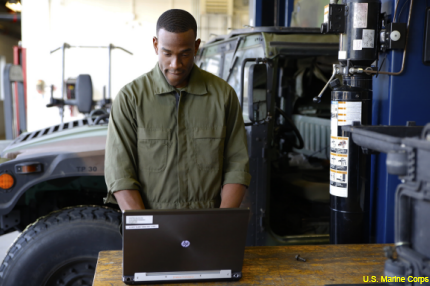New software speeds up Marines' online ordering, even when not online
Three new applications in the Corps' logistics support system lets even Marines without Internet connectivity handle of the hard part of online transactions.

A Marine in the motor bay at The Basic School taps into GCSS-MC.
Online ordering of supplies can save a lot of time, particularly for armed forces deployed around the world. But if you don’t have a good Internet connection, you could be out of luck. The Marine Corps acquisition force is cutting into that disadvantage with new software that speeds up the process of placing orders even when Marines can’t send an order at the moment.
With the latest software update to the Marines’ acquisition system, even Marines in areas without Internet connectivity can shop for weapons and equipment and fill out order requests, which can save them a lot of time. They might not get to place their orders right away, but they’ll be ready when the opportunity presents itself. And, perhaps most important to Marines, they’ll spend less time in the system than they did before.
The new release of the Global Combat Support System-Marine Corps (GCSS-MC), Version 1.1.1, includes three applications that help accelerate the ordering process: Mobile Field Service, Tactical Wide-Area Network and Enhanced Automated Task Organization.
The store-and-forward Mobile Field Service lets users download and fill out forms regardless of their Internet connectivity, then send the forms when they have a better connection. “It’s great when Marines are aboard ships where signals can be spotty or guys work in maintenance areas with no connection,” Dave Hansen, program manager for GCSS-MC, said in a news release. “It saves them from having to write down all their transactions and re-enter them later.”
The Tactical Wide-Area Network, or TWAN, provides a data cache that makes the form-filling process faster over time. “It learns what you’re putting into the forms,” Hansen said. “And then, over time, TWAN stores that information to help you fill in the forms faster. Overall we see about a 30 percent reduction in transaction time.”
And the Enhanced Automated Task Organization, or EATO, saves the most time, because it allows group transactions in GCSS-MC, which previously required that all transaction be individual.
“Take the example of establishing a Marine Expeditionary Unit from a Marine Expeditionary Force—you’re transferring a lot of gear, and each piece has to be accounted for,” Hansen said. “Before we had EATO, we had to do individual transactions numbering around 8,000, which takes about three months. With EATO, you have to fill out a few things beforehand, but what took months now takes a few hours of Marine interaction, and the system does the rest in the background.”
Bottom line: Deployed Marines are spending less time in GCSS-MC to do the same things they were before, taking about the same amount of time from aboard a ship as they would in garrison, Hansen said.
NEXT STORY: Self-guiding bullet can now hit a moving target




